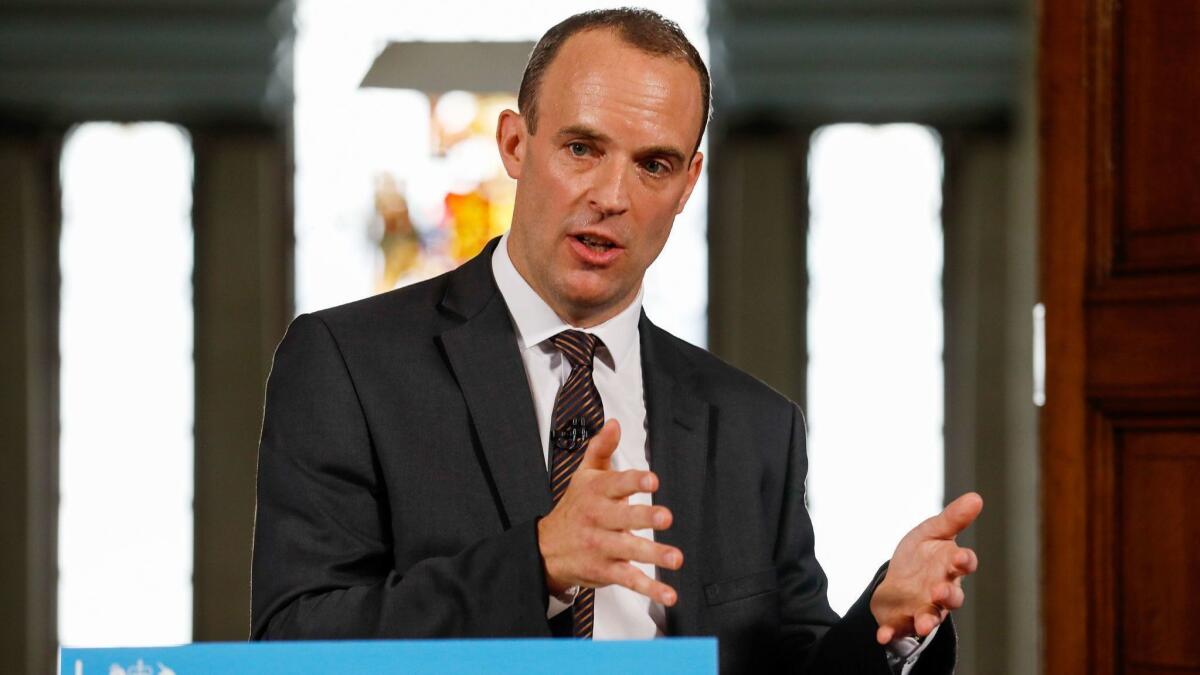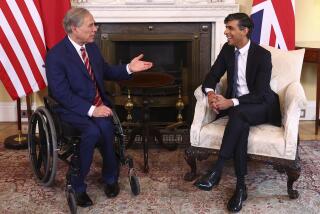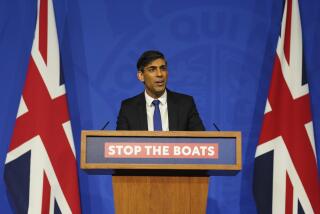Britain faces major disruptions if it can’t reach an EU exit deal, but says it’s confident a pact is coming

Britain leaving the European Union without an exit deal could mean substantial disruption to everyday life, the government said Thursday, from higher credit card payments to a loss of banking and pension services and even to redesigned cigarette packages.
The government emphasized that an exit deal with the bloc of 27 other nations was still expected by early next year but said a series of technical documents would provide contingency plans in case no deal is reached.
In addition to financial services, the documents on planning for no deal cover areas including medical products and extra customs checks and duties at borders.
Dominic Raab, the secretary of state for exiting the European Union, tried to strike an upbeat tone during a speech in London in which he unveiled carefully worded “technical notices.”
“I am confident a good deal is within our sights,” he said. “That remains our top priority. It remains our overriding priority.”
The “Brexit” chief also addressed concerns Thursday that have appeared in the British press about a so-called sandwich famine that would be caused by an ingredient shortage in a no-deal scenario.
“Let me assure you that, contrary to one of the wilder claims, you will still be able to enjoy a BLT after Brexit, and there are no plans to deploy the Army to maintain food supplies,” he said.
Raab stressed that he remained confident a good deal was not just possible but well within the government’s grasp and that the documents were merely contingency plans so that all eventualities had been accounted for.
But they were promptly pounced on by the opposition Labor Party’s Brexit secretary, Keir Starmer, who said that if Britain bowed out of the EU without a concrete deal, it would signify a “complete failure of the government’s negotiating strategy.”
The documents are the first of a series of papers that the government will be publishing in the coming months aimed specifically at dealing with what happens if the two sides cannot agree on what their future relationship will look like.
They cover a range of industries from farming to the financial services and medicine, and they represent the first time the government has so plainly laid out what could happen to the post-Brexit landscape if no deal is reached.
New health warnings would also have to be designed for cigarette packets, as the current images are copyrighted to the EU, and medicines would have to go through a “national assessment” process before they could be sold in the UK, which could cause delays.
Health Secretary Matt Hancock urged drug companies to stockpile six weeks’ worth of medicines in case certain routes through the EU face delays if no deal is reached.
Chancellor Philip Hammond, Britain’s finance minister, said in a letter to the Treasury Committee, also published Thursday, that there could be a 7.7% hit to gross domestic product if Britain leaves the EU without an agreement about how goods and services will flow after Brexit.
Britain’s membership in the European Union is expected to end March 29, 2019, when its access to the bloc’s single market and customs union would cease.
Negotiations aimed at ensuring a smooth transition from being a member to merely a trading partner have been underway since March 2017, when Prime Minister Theresa May triggered Article 50 of the Lisbon Treaty, which formally began divorce proceedings.
There has been rampant infighting within May’s Conservative Party over what Brexit should look like and incessant rumors about leadership challenges. Two high-profile Cabinet members — former Foreign Secretary Boris Johnson and former Brexit Secretary David Davis — resigned in July in disagreement over the way the negotiations were being handled.
And despite May’s attempts to unite the country with her Brexit strategy, polls show the general public appears to be virtually as divided as it was the day after the 2016 referendum vote in which 52% of the country voted to leave and 48% voted to remain.
May has maintained that leaving the EU without any deal would be better than leaving with a bad deal, but until recently that seemed to be more rhetoric than reality.
Calls for a referendum on the final Brexit deal — the so-called People’s Vote campaign — have started to gain pace amid fears from some voters that a no-deal scenario would be disastrous.
The multimillionaire owner of the clothing brand Superdry gave 1 million pounds, about $1.28 million, to the campaign last week saying he saw a “genuine chance to turn [Brexit] around.”
There have also been dire warnings about the effect that no deal could have from other groups, including police chiefs, emergency services and the farmers union.
Pro-Brexit campaigners describe doomsday scenarios as “Project Fear,” but Barney Scholes, spokesman for the People’s Vote campaign, said Thursday that he believed a “crunch point” was approaching.
“More and more people, from every region and nation, from all walks of life, are demanding a People’s Vote on any Brexit deal or the outcome of negotiations,” Scholes said.
Boyle is a special correspondent.
More to Read
Start your day right
Sign up for Essential California for news, features and recommendations from the L.A. Times and beyond in your inbox six days a week.
You may occasionally receive promotional content from the Los Angeles Times.






